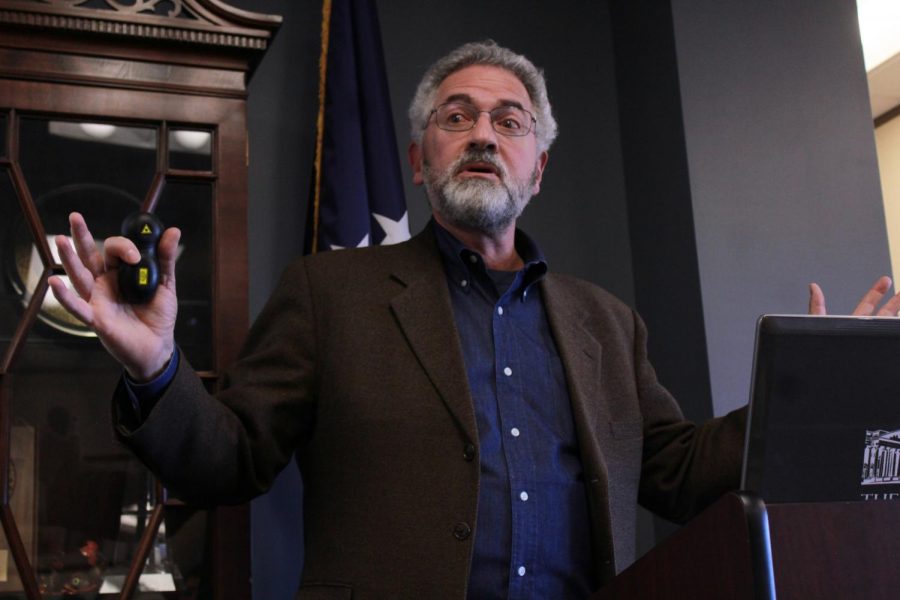Foley presentation broke down ‘the Boy Problem’
Lecturer says society must question privilege, empower all genders
OLIVIA WOLF | THE DAILY EVERGREEN
Michael Gurian, New York Times bestselling author, speaks about how the brains of boys influence their actions on Thursday afternoon in the Foley’s Speaker’s Room at Bryan Hall.
February 8, 2019
The Foley Institute presented “The Boy Problem” yesterday, a lecture that focused on how public policy is failing men and young boys.
The lecture featured Michael Gurian, New York Times bestselling author, marriage and family counselor, and co-founder of the Gurian Institute of Spokane.
“Our concept has been white males have it all and women don’t have it, and we don’t need to payChl attention to boys, but that isn’t the case anymore,” Gurian said.
Philosophy major Mark Tronsen said he is a regular attendee of the Foley lectures.
“I saw the topic “The Boy Problem” and knew it was in direct reference to the controversial Gillette ad, and I was immediately interested and wanted to know more,” Tronsen said.
After raising two daughters, Gurian sees himself as a fairly liberal feminist, he said, and he believes these ideals are crucial to solving “the boy problem.”
“I’ve always known if we were going to empower both, we were going to help both,” Gurian said. “I don’t see us making gains for women specifically because of the fact that so many males are in distress.”
During his lecture, Gurian discussed several myths he said we must dispel to empower boys. First, he said we should question whether men always have more privilege than women.
We see the 50,000 or so white men at the very top running the country and the world, he said, but below that is where the issues emerge.
Gurian said the nationwide STEM test scores gap that the media focuses on is about three points, while the male literacy gap is 10 points — more than three times larger.
“We have to find a way to empower and help females —which is not gonna stop,” Gurian said. “But we have to realize that today is not 50 years ago, and a lot of the adults suffering in our world are men.”
Gurian also specified the importance of not attacking all white males. These attacks assume all white males are part of the dominant class, he said. There are several public systems set up to favor women, he said, such as child custody, the school system and even the disciplinary system.
Boys in traditional education account for 85 percent of discipline problems, 75 percent of students with learning disabilities and only 40 percent of college undergraduates, according to Gurian.
Another myth Gurian addressed was the belief that there are no differences between men and women’s brains. Much of Gurian’s research is rooted in neuroscience, and he said it is important to see the differences in the ways female and male brains work. These trackable differences do not mean one sex’s brain is superior to the other, he said.
Male and female brain differences, however, do not provide an argument against nonbinary gendered people, Gurian said. Research has shown that transgender individuals’ brains act in the exact opposite way as their reproductive systems do. Both physiology and neurology are controlled by X and Y chromosomes.
“The male and female brains are binary, but they’re on a spectrum,” Gurian said. “Culture does not matter to X and Y. [Behavior] still manifests no matter what culture it’s in.”
The differences are responsible for the high number of boys dropping out of high school and college, Gurian said. He explained how when the male brain is in “rest” it is far less active than the female brain in “rest,” and often can go to rest after only 10 or 20 minutes of sitting still.
The final myth Gurian addressed is the idea that all social problems exist because of traditional masculinity, including characteristics such as stoicism and aggression. He clarified there has been no data to back up that either stoicism or aggression lead to violence, and some social scientists are aiming to teach women to be more stoic and aggressive.
“I was in the military prior to coming here, and there I noticed it can be difficult to get women up to the necessary ‘rage point,’ but it’s usually pretty easy to get men there,” Tronsen said.
The Foley Institute will host Aseem Prakash of University of Washington and Jeff Joireman of the Carson College of Business to discuss corporate environmentalism at 12 p.m. Feb. 19 in Bryan Hall, RM 308. Prakash will also discuss the politics of the carbon tax later that day at 4:30 p.m.





















